Israel, a global leader in agricultural innovation, has unveiled a revolutionary approach to desert farming, enabling the country to increase crop yields and mitigate the effects of climate change. The new techniques, developed by Israeli scientists and farmers, involve the use of advanced irrigation systems, specialized crop breeds, and precision farming methods. These innovations have allowed Israel to transform its arid desert landscapes into thriving agricultural hubs, producing a wide range of crops, including fruits, vegetables, and grains. The desert farming initiative is part of Israel’s broader efforts to address the challenges of climate change, water scarcity, and food security. By leveraging its expertise in agriculture and technology, Israel aims to become a major player in the global food market, while also promoting sustainable and environmentally friendly farming practices. The country’s desert farming projects have already shown promising results, with crop yields increasing by up to 30% and water consumption decreasing by up to 50%. The Israeli government has invested heavily in the development of these innovative farming techniques, recognizing the potential for desert farming to contribute significantly to the country’s economy and food security. The new methods have also created opportunities for farmers and agricultural entrepreneurs, who are now able to cultivate crops in areas previously considered unsuitable for farming. Furthermore, the desert farming initiative has helped to promote rural development and job creation in Israel’s peripheral regions. The use of advanced technologies, such as drones, satellite imaging, and precision irrigation systems, has enabled farmers to optimize crop growth, reduce waste, and minimize environmental impact. Israeli farmers are now able to grow a wide range of crops, including avocados, dates, and grapes, in the desert regions, which were previously thought to be inhospitable to agriculture. The success of Israel’s desert farming initiative has also attracted international attention, with countries from around the world seeking to learn from Israel’s expertise and experience. The Israeli government has established a number of programs and partnerships to share its knowledge and technology with other countries, with the goal of promoting global food security and sustainable agriculture. In addition to its economic and environmental benefits, the desert farming initiative has also helped to promote social and community development in Israel’s rural areas. The project has created new opportunities for women and minority groups, who are now able to participate in the agricultural sector and contribute to their local economies. The Israeli desert farming model has also been recognized as a best practice by international organizations, such as the United Nations Food and Agriculture Organization (FAO). The FAO has praised Israel’s innovative approach to desert farming, which has helped to increase food production, reduce poverty, and promote sustainable agriculture. Overall, Israel’s desert farming initiative is a testament to the country’s ingenuity and commitment to innovation, and is expected to have a significant impact on the global food market and the environment in the years to come. The project has also highlighted the importance of international cooperation and knowledge sharing in addressing the challenges of climate change and food security. As the global population continues to grow, the need for sustainable and innovative agricultural practices will become increasingly important, and Israel’s desert farming initiative is well-positioned to play a leading role in this effort. With its unique combination of technology, expertise, and innovation, Israel is poised to become a major player in the global food market, while also promoting sustainable and environmentally friendly farming practices. The country’s desert farming initiative is a shining example of what can be achieved through determination, creativity, and a commitment to innovation, and is expected to inspire other countries to follow in its footsteps.
